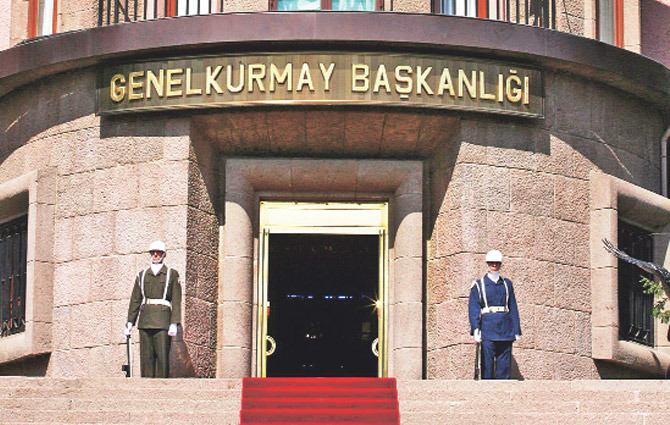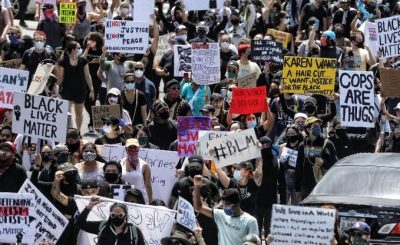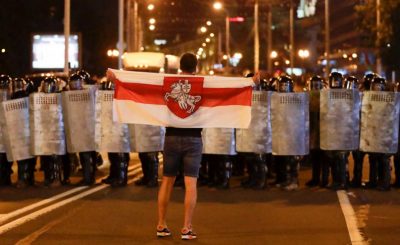After the accident in Susurluk, the oligarchy went through one of it most bitter internal fights. A large part of the population, and the revolutionaries with them, had been trying for decades to reveal the real face of the state, risking their lives in doing so. But these sacrifices had not been in vain because as a result of the gathered experience, the people were able to recognise the fascist face of the state in Susurluk, a face it had not seen before. The suspicion of normal people were confirmed in Susurluk.
The TÜSIAD (Turkish Employers and Business Association), the collaborator of the imperialist which is playing now a different role as usual, offers the state and numerous institutions programmes, containing stabilisation packages. There was rather a large interest in these programmes of the TÜSIAD. Essentially, the TÜSIAD stated quite clearly that if the state was not going to be restored by means of new programs, the system would be in grave danger. The imperialists forced these views upon the TÜSIAD and they have been developed according to the character of the collaborators.
The imperialists and their collaborators established their political rule through the system parties. Despite support by the imperialists and the monopolies, the parties did not succeed in designing a new policy which would even partly guarantee the stability of the state and reduce the potential of opposition among the people’s masses. So the imperialists were forced to look for new ways. When the existing parties do not sufficiently serve the imperialists and fascism, new parties are founded. The parties which are no longer of any use, are discarded. Most important, the economical and political profit of the collaborators of the imperialists is right and the continuation of the system is guaranteed. In this sense, anything is possible, all methods are allowed. In case Islam is of any use, Islam will be used as well.
When a junta is needed, a junta will be put in power. If need be, artificial enemies are depicted and the support by the left within the system is asked for under the disguise of democracy. Old governments are brought down with lies and deceit, new governments are formed.
When the republic was founded, Mustafa Kemal proclaimed the aim of achieving “the level of a man of culture” and the despotic methods he used are still applied in another way. All the bourgeois parties, and even renown fascist parties and generals of the junta, tried to practice politics as apostles of democracy. The junta of September 12, claiming to bring democracy on the right track again, in fact aimed at liquidating the revolutionary movement and the opposition forces for which it used almost all Islamic structures. It was not forgotten to support them economically and politically to integrate them into the system. Islamic forces occupied almost all posts in the state apparatus and the system. Religion is an important force in Turkey.
The state wanted to exploit religion to secure its future and for the benefit of profit. The state could not use religion as it pleased with its bureaucratic cadres. Religion as a power of sustenance has always been under the influence of the sheikhs and sectarian leaders.
Therefore all the politicians, including Mustafa Kemal and the army, tried to get this power in their hands by several manoeuvres. Despite several differences, the Islamic forces were able to rally behind the demand of the “Sharia”. The continuing support by the system parties and the army and the discussions about religion in politics gave the religious forces the impression that it was possible to gain power within the system in a cunning way. They pursued this thought and made a theory out of it in the end. This development and the support by the state prevented a radicalisation of the Islamic movement as occurred in other countries. That’s why the Islamic organisation never declared the state to be a direct target of their attacks. It is only natural that those who do not make the state a concrete target of the struggle, are opposed to those who attack the state directly and that they seek their place in a peaceful coexistence with the state.
The Islamists followed the tradition of “takiyye” (1) which they have applied for decades and this caused them to form one front within the system with the state and the fascists, united against the opposition forces. The coup of September 12 was meant to protect the system. But it became apparent that this protecting was not going to be lasting because of the specific nature of the oligarchy and that the crisis was becoming even worse. The governments of the oligarchy are aware of the strength of the army and they often felt it. That’s why they are eager not to pursue a policy against the army, looking for ways to establish their own power so they wouldn’t wake up one morning, being interrogated in Zincirbosan. When they realised that the MIT (National Intelligence Agency), traditionally subordinated to the army, could not be controlled, the Özal government set up an alternative secret service. The tradition authority of the secret service, until then with the MIT, now found its counterpart within the police force.
The massacres, provocations and all kinds of criminal activities, perpetrated in the past by the MIT, were now carried out by the police. With the increase of the revolutionary war, the gendarmes and special units were deployed more and more and the MIT disappeared out of the picture. The revolutionary war was spreading across the country and now the contra-guerrilla gangs emerged. The contra-guerrilla war against the revolutionaries increased, as did the struggle for profit. This struggle for profit caused a struggle for power and a discussion how to defend the state ideologically.
The institutions of the oligarchy, the system parties and its politicians could not find asolution against the people’s struggle. The massacres and the violence, ostensibly carried out to end terror, didn’t work and backfired. The system parties couldn’t even supply the beginning of a solution and the crisis deepened. The imperialists and the monopoly bourgeoisie could not watch idle. The TÜSIAD and the MGK (National Security Council) have openly taken over the role of the parties. To bring the system parties under their control, as wished by the imperialists, campaigns were launched and the solution proposals of the TÜSIAD were presented to the public.
These TÜSIAD programs were only the beginning. They were to be followed. In the name of stability, the oligarchic state mechanism had no other solution than violence to discipline the bourgeois parties. The task of the TÜSIAD was taken over by the National Security Council. Planned by the general staff and supported by the monopoly capitalists, the public was exposed the propaganda about a military coup and the Sharia.
By creating an artificial fear for a interim regime, a black regime and the Sharia, they tried to broaden their own front to liquidate those parties who could neither guarantee the stability of the system, nor could be disciplined. So many bourgeois parties, trade unions and several so-called left-wing groups were drawn into the front of the MGK and the TÜSIAD. Because of the active public appearance of these forces, the fear for the Sharia and a military coup spread. While many forces took a military coup seriously, the MGK – like a political party, entered the arena. However, it did not carry out a military coup, it just increased fear. And so it increased its own strength.
In this phase, neither a Sharia-led state power existed, nor the danger of a military coup. These notions were brought into the discussions as a result of the inability to guarantee stability by the system parties. This theory was brought up by imperialism. The political failure of the system parties and the contra-guerrilla gangs which reached a stage where they harmed the system and could no longer defend it, forced the imperialists to implement changes. Otherwise the revolutionary people’s movement would gain strength and the system would even be more endangered. The Refah party, portrayed as a “Sharia danger” did in fact not move outside of the policy of imperialism and the MGK.
To proof itself, Refah and the DYP carried out massacres and repression without a second thought. But despite their efforts, the Refah party and the DYP could not offer a solution for the instability in the country. Aware of the fact that its old allies had fulfilled their function, the imperialists and their collaborators chose the way of liquidating the RefahYol government.
Using the Refah party as a scapegoat, notions like the Sharia and sectarianism were to be propagated as a danger, nationalism was to be stimulated – based on Kemalism – and the Sharia was to be proclaimed public enemy no 1. Thus the system forces, including some groups, were to be united in the front of the TÜSIAD and the MGK. The DYP, and especially Tansu Ciller, were to be linked to the contra-guerrilla gangs. The embezzlements, carried out by all, the executions which could no longer be kept secret, the massacres, disappearances and other means of oppression by the contra-guerrilla gangs were to be blamed to them in order to keep the hands of the state clean. The imperialists called the revolutionary struggle in Turkey terrorism and considered every method which was applied against the revolutionaries legitimate.
Until now no government resisted the economic, political and military policy of the imperialists, all of them carried out this policy. The Refah party and the DYP became consequent collaborators of the imperialists as well, but because they have fulfilled their function, they are no longer needed. However, there is a need for new actors who are able to reduce the potential of opposition among the people’s masses with their “democracy games” and who are willing to continue oppression and exploitation in the name of democracy. Despite some manoeuvres by Refah, applying “takiyye”, the MGK, as well as TÜSIAD, know that there is no threat of a “Sharia state”. The real problem lies in the fact that the oligarchy is unable, despite its willingness, to overcome the present crisis. The place of the Refah party could be taken by any other party. Because of the existing dependency, the crisis and the ongoing war, no government is able to offer a solution.
This crisis will continue, and get worse, until there is a revolution. Until then, governments will be brought down and new ones will be formed. Despite the demagogy about democracy and the claims to oppose the gangs, oppression, violence and the gangs will remain, and it will deteriorate. When the imperialists spoke about democracy, TÜSIAD and the MGK immediately began to implement this policy.
Since the Refah Party became a power in itself because of the support by the state, the state is no longer in the position to use religion as its tool as it pleases. As a result of the demagogy of the Refah party, religion was seen as a possible road to liberation by broad masses of the poor people. Because the people’s masses can not see through the collaborationist and conformist face of the Refah party, they take side with Refah and other Islamic fronts on the basis of religious motives, containing notions like justice, rights and resistance against cruelty.
This is one of the contradictions between the state and Refah. The state crisis has reached such a dimension that the state can’t even uphold its status quo. Exactly at this point the essential task of the imperialists and its collaborators comes into place. Based on Kemalism, Islam and the Europeanisation, the people’s masses on channelled. The program, proposed by TÜSIAD, propagates imperialist democracy. The task force of the MGK, oriented to the West, constitutes a direct message to the imperialists. And they do not behave unfavourable towards the TÜSIAD program. Although there were initial reactions against the proposal of TÜSIAD to abolish the MGK, the MGK itself pursued the policy of the imperialists after the imperialists intervened. In this way the MGK became the main institution considering the demands for Kemalism, human rights, against embezzlements and against the gangs, and for the solving of many other problems. And many forces who had championed these demands became the unarmed accomplices of the MGK.
Defending the thesis that there will be no military coup in Turkey anymore would surely be false. In a country which is constantly in a state of crisis, there is always the danger of a military coup. However, the fact remains: without the support of the imperialist, nobody would dare to carry out a military coup. Imperialism has many other alternatives at its disposal. In the history of the Turkish Republic, the political parties have always been relatively powerless. The army and the bourgeoisie were always considered to be the decisive powers. In the past, a military coup was always seen as a solution for a crisis, a crisis which is now culminating. The chain of military coups till now has caused coups an ineffective tool. This forced the imperialists to look out for other possibilities.
This is the reason why the MGK started to act like a political party, without carrying out a military coup. In stead of the army, institutions like the trade unions were used. They will create the conditions for a coup when they are convinced that such a coup would bring a solution. The political call of some left groups and trade unions against a military coup are also conforming the policy of the imperialists and TÜSIAD. Without doubt, the “Sharia threat” is nothing more than a planned, artificial phenomenon. It is known also that the imperialists and TÜSIAD favour a pseudo-democracy, not a military coup. The notion of a coup was raised by the MGK to unite the forces against the Sharia. Under this slogan, the left forces were conscribed as reserve forces of the MGK. The MGK caused the fall of the Refah party and it put the new ANASOL-D government in its place. It’s a public knowledge that this government will do nothing for the people, that it will continue to implement the decisions of the MGK and that it will continue the exploitation and cruelties, they will in fact get worse. Those who gathered around notions like the Sharia and a coup are accessories to the Mesut Yilmaz government.
Nowadays the supporters of a Sharia state propagate anti-system slogans, even slogans which are adopted from the revolutionaries, and they organise the poor segments of the population. Of course, the revolutionaries wage a struggle against the governments who hide exploitation and oppression behind the mask of the “Sharia state”. But the fundamentalists are not in power, in organising the masses they claim to oppose the system, but in reality the move within the boundaries of this system. It is not dangerous for the revolutionaries when the fundamentalists take away the weapon of religion from the state. It is advantageous for the people when the weapons, abused by the state against the people, are taken away from the state. In this, it is not important whether they are loyal to the system, or whether they oppose it. The only thing important is that all those who are in contradiction to the oligarchy are fighting against the present state. There are several contradictions in every period of time. These contradictions can not all be seen as the main contradiction. The present main contradiction is not the Sharia, it is imperialism, it is TÜSIAD and the MGK.
The fundamentalists will see that they will not achieve their goals with their sly manoeuvres and their methods of resistance which are in fact loyal to the state. They will make no progress. With the fall of the Refah party, discussions within Islamic circles increased. The Refah party will maintain its share in new elections when there are no provocations. In this phase it will be even more difficult for the oligarchy to get out of its crisis. The Refah party, striving for power, will have to adopt to the imperialist policy because only then will they have a chance to get in power. Otherwise it will have to continue its role in the opposition.
When they get in power, according to the conditions of the imperialists, this will mean for Refah that its demagogy will be exposed. It will become clear to the people that there is no difference with the other system parties. With an electoral victory of the Refah party, which will lead them to power, new cadres will emerge within the party who will start to organise and fight without the system. We as revolutionaries must be aware that it is not our primary task to fight against the Sharia state, we will have to act according to our knowledge how the state and the Refah party are using religion as a weapon. The discussions about a secular state and the Sharia are just artificial debates, instigated by the imperialists and the oligarchy to solve their own internal contradictions and to counter the revolutionary resistance. We must advocate a common struggle of all forces which oppose fascism, imperialism and the existing state, even when these forces are Islamists and want a state which is governed by the Sharia. Of course, there are no similarities between the revolutionaries and the fundamentalists. But although they are loyal to the system and although they collaborate with the imperialists and the state, a large majority of the fundamentalists speak out against imperialism, exploitation and cruelty.
We must make an effort to hold them to their words, the bring them on a line of struggle against the state. The masses which are now under the influence of the fundamentalists will eventually see the demagogy of the Islamists in case we act as said above. Because those who are propagating against the Europeanisation and an imperialist democracy are not the left, they are the Islamists. They have changed this war into a war between Christianity and Islam. We will have to take away this weapon from the fundamentalists as well. We will have to expand our propaganda in the knowledge that the history and the tradition of our peoples are not those of imperialism, they are the history and the tradition of the peoples in the Middle East, the Caucasus and the Balkan and we must act according to the differences in nationality of the Turkish, the Kurdish and all other nations.
Notes:
(1) takiyye: method used to achieve the establishment of a Sharia state by which such a state is disguised as a democracy, leading to an integration within the ruling system.




